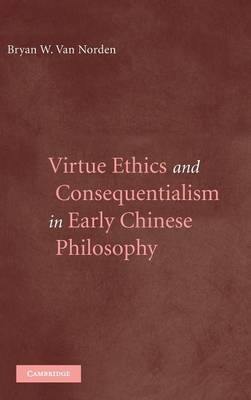
Virtue Ethics and Consequentialism in Early Chinese Philosophy
Seiten
2007
Cambridge University Press (Verlag)
978-0-521-86735-1 (ISBN)
Cambridge University Press (Verlag)
978-0-521-86735-1 (ISBN)
In this book, Van Norden examines early Confucianism as a form of virtue ethics and Mohism, an anti-Confucian movement, as a version of consequentialism. The philosophical methodology is analytic, in that the emphasis is on clear exegesis of the texts and a critical examination of the philosophical arguments proposed by each side.
In this book Bryan W. Van Norden examines early Confucianism as a form of virtue ethics and Mohism, an anti-Confucian movement, as a version of consequentialism. The philosophical methodology is analytic, in that the emphasis is on clear exegesis of the texts and a critical examination of the philosophical arguments proposed by each side. Van Norden shows that Confucianism, while similar to Aristotelianism in being a form of virtue ethics, offers different conceptions of 'the good life', the virtues, human nature, and ethical cultivation. Mohism is akin to Western utilitarianism in being a form of consequentialism, but distinctive in its conception of the relevant consequences and in its specific thought-experiments and state-of-nature arguments. Van Norden makes use of the best research on Chinese history, archaeology, and philology. His text is accessible to philosophers with no previous knowledge of Chinese culture and to Sinologists with no background in philosophy.
In this book Bryan W. Van Norden examines early Confucianism as a form of virtue ethics and Mohism, an anti-Confucian movement, as a version of consequentialism. The philosophical methodology is analytic, in that the emphasis is on clear exegesis of the texts and a critical examination of the philosophical arguments proposed by each side. Van Norden shows that Confucianism, while similar to Aristotelianism in being a form of virtue ethics, offers different conceptions of 'the good life', the virtues, human nature, and ethical cultivation. Mohism is akin to Western utilitarianism in being a form of consequentialism, but distinctive in its conception of the relevant consequences and in its specific thought-experiments and state-of-nature arguments. Van Norden makes use of the best research on Chinese history, archaeology, and philology. His text is accessible to philosophers with no previous knowledge of Chinese culture and to Sinologists with no background in philosophy.
Bryan W. Van Norden is associate professor in both the philosophy and Chinese and Japanese departments at Vassar College. He has edited and contributed to Confucius and the Analects: New Essays and Readings in Classical Chinese Philosophy. A Fulbright Fellow, he has also received grants from the National Endowment for the Humanities, the Chiang Ching-kuo Foundation, and the Andrew W. Mellon Foundation.
1. Introduction; 2. Kongzi and Ruism; 3. Mozi and early Mohism; 4. Mengzi; 5. Pluralistic Ruism.
| Erscheint lt. Verlag | 11.6.2007 |
|---|---|
| Verlagsort | Cambridge |
| Sprache | englisch |
| Maße | 152 x 229 mm |
| Gewicht | 710 g |
| Themenwelt | Geisteswissenschaften ► Philosophie ► Ethik |
| Geisteswissenschaften ► Philosophie ► Östliche Philosophie | |
| Geisteswissenschaften ► Religion / Theologie ► Weitere Religionen | |
| ISBN-10 | 0-521-86735-5 / 0521867355 |
| ISBN-13 | 978-0-521-86735-1 / 9780521867351 |
| Zustand | Neuware |
| Haben Sie eine Frage zum Produkt? |
Mehr entdecken
aus dem Bereich
aus dem Bereich


